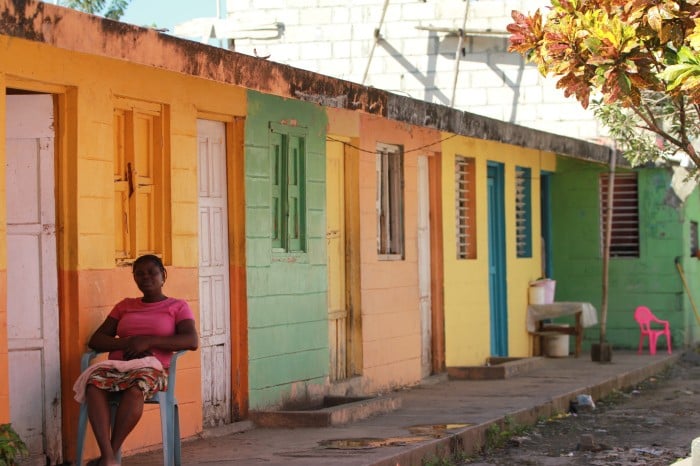
Yean and Bosico: A decade long pursuit for equality, nationality and an end to discrimination
Marcelo Hinojosa interns with MRG’s Cultural Programmes department. Here he looks back at an historic legal decision in the Dominican Republic and assesses its current implications.
A decade ago on the 8th of September 2005, the Inter-American Court of Human Rights ruled in favour of the Dominican girls Dilcia Yean and Violeta Bosico against the Government of the Dominican Republic.
The two Dominican girls had petitioned the Inter-American Commission on Human Rights on the grounds that they were being deprived of their nationality by their own government, despite having been born in the Dominican Republic. MRG assisted with legal support by creating an Amicus Curiae Brief for the case, and since 2010 MRG has been involved in the Dominican Republic; providing legal support, advocacy and promoting cultural integration, through its cultural programme.
Without their nationality, the girls were vulnerable to being expulsed by their own country. The plea also claimed that without their official documents, they would not be able to attend school and thus be deprived of their rights to education. After a lengthy process, the Court ruled that the Dominican government had violated their rights to equality and non-discrimination, to nationality, to having a legal status and a name. The Court also found that without the right to nationality, the girls were excluded from a political community.
This week, MRG had the opportunity to speak with a member of the Movement of Dominican-Haitian Women (MUDHA) -an NGO in the Dominican Republic- that helped Yean and Bosico throughout the whole process. They are actively involved in helping Dominican women of Haitian descent in similar situations. For MUDHA the case marked a significant breakthrough in the Dominican Republic as it “opened channels for dialogue on human rights issues”. Ten years ago it was much harder to approach the Courts and to seek legal access to justice. Today, there is a Constitutional Tribunal, and according to MUDHA, this evolution means that “people can defend themselves with less fear”.
The case also started a trend in the Dominican Republic: people are using international avenues to seek justice within their country. MUDHA believes this is particularly important because the Dominican Republic system is still not ready to apply justice until racism and discrimination issues are properly addressed; “Until then, the people under threat will have to keep making use of the international courts”.
To celebrate the anniversary, a conference was held in the Autonomous University of Santo Domingo in the Dominican Republic. The conference included MUDHA representatives, as well as other NGO’s, students and Violeta Bosico. Addressing the panel, Bosico spoke about the importance of getting her documents 10 years ago. In Bosico’s opinion, it would have been impossible to achieve this without the support of MUDHA and other NGO’s. She emphasised how “they never abandoned her or Yean despite setbacks along the way”.
Bosico is currently accomplishing her goal of finishing her studies in psychology with the hope of applying her degree to help people that are in a similar situation. “After finishing primary school, I knew people were going to need my support”, claimed Bosico. This explains why she chose a field that would provide her with the necessary tools to assist and give guidance.
Aid and guidance are in high demand in the Dominican Republic. Despite various sentences and regularization processes, there remains an overall state of confusion and uncertainty within the Dominican-Haitian community. MUDHA confirms that there are three groups of people in danger of becoming stateless.
First, the Dominicans that were stripped of their documents and who are now waiting to be audited in the hopes of getting them back. Second, Dominicans who never possessed documents, and are now being given Foreign Identity Cards. According to MUDHA these cards have proven to be useless when applying for birth certificates. Third, the Dominican- Haitian immigrants who are given a non-resident card that prevents them for working or having access to any other service. Today, many communities remain weary and fearful, without their documents the threat of mass deportation to a country unknown to them is growing.
Ten years ago, the Dominican-Haitian community won a great battle with the Yean and Bosico ruling, but the fight for their right to a nationality and their quest for non-discrimination is far from over. For MUDHA it is imperative that the government create functional identities that take into account discrimination issues, and help avoid sensationalist attacks from the media and groups that spark xenophobia within the Dominican Republic.
Above all MUDHA hopes to contribute by teaching the values of coexistence and respect, so that the people from the Dominican Republic learn to live in a multicultural and multiracial society. For Violeta Bosico the memory of getting a call informing her of the ruling in her favour remains present, and it is a symbol of optimism that things will work out for the Dominican-Haitian community. However, it is also a reminder “that things didn’t end there, that there is still a lot of people that need our help”.
—
This article reflects the opinion of its author only and does not engage MRG’s responsibility.